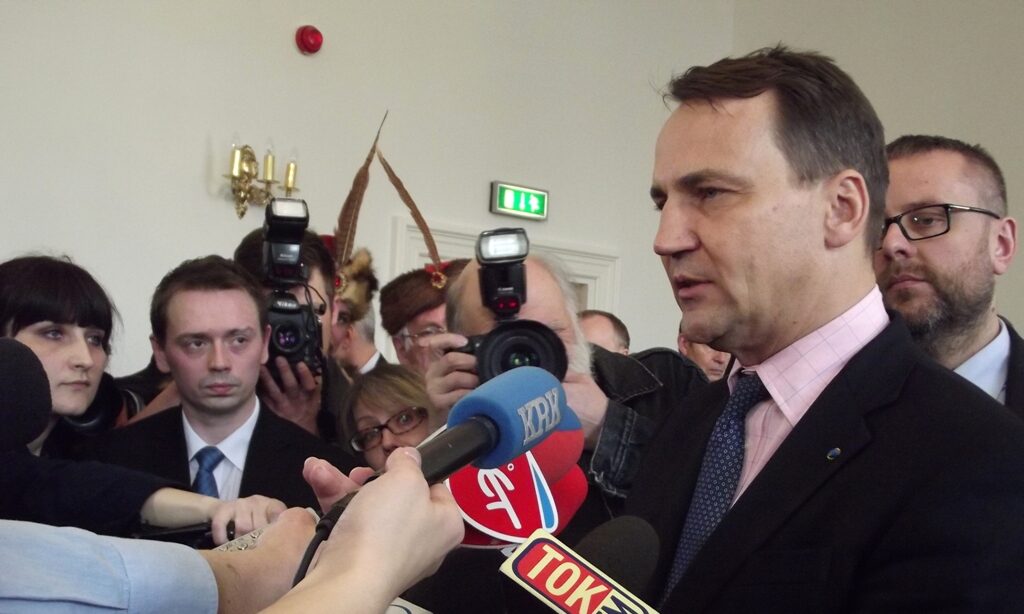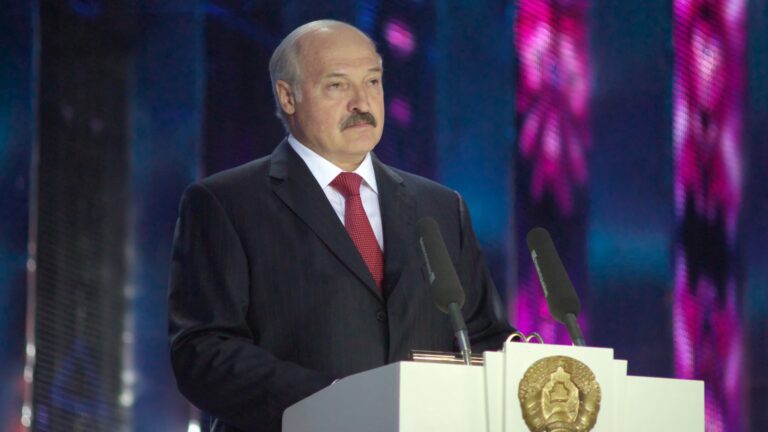
Almost two months after the elections, Poland is set to see a new government with both a returning Prime Minister, Donald Tusk, and a Foreign Minister, Radosław Sikorski. Sikorski, the longest-serving Polish chief diplomat since 1989, has extensive experience and high ambitions for Poland’s European presence. His nomination not only hints at a potential recalibration of Poland’s stance towards China but also carries implications for Warsaw’s aspirations to play a more significant role in shaping the EU foreign policy.
After a period of internal turbulence, Poland has finally witnessed the formation of a new government, forged through a coalition of the liberal Civic Coalition, centrist Third Way, and the Left. With significant changes on the horizon after eight years of Law and Justice rule, the spotlight now shifts to the cabinet roster. One of the names garnering the most attention is Foreign Minister Radosław Sikorski, who will play a crucial role in shaping the country’s new international strategy.
Sikorski is a seasoned politician with a significant background in foreign affairs. A long-time member of Civic Platform, the party of new Prime Minister, Donald Tusk, Sikorski has an impressive CV, including studies at Oxford, a role as National Security Minister (2005-2007), and almost two terms as Foreign Minister (2008-2014). Informally described by another member of the Civic Coalition as “a killer,” he brings a mix of experience and reputation to the role.
At the same time, he is no stranger to controversy, often making the headlines with bold comments, such as one on the Nord Stream sabotage. Additional controversies involve significant honorariums from the United Arab Emirates and accusations from the Polish right of pursuing a too-friendly policy toward Russia before the Crimea invasion in 2014.
The last time Sikorski took the reins of Polish diplomacy, also after Law and Justice rule, he asserted a goal of reorienting the nation’s foreign policy back to Europe. This trend seems poised to continue, with even more ambitious goals this time around. During his inaugural address as Prime Minister, Tusk declared Poland’s commitment to reassume the role of a leader within the EU. In Sikorski’s view, Poland, once a proponent of soft power strategies like the Eastern Partnership, is ready to wield hard power, with the aspiration to steer European policies.
Taming the Dragon
A recent MapInfluenCE analysis by the author highlights the limited involvement of Polish politicians in China affairs. Sikorski may just change that, because, as he declares, “it is high time we give China the attention that she deserves.” And he has the credentials to do so. In 2021, he authored the EPP’s China strategy, emphasizing “cooperation where possible, competition when needed, and confrontation when necessary.”
The new foreign minister sees the rise of an increasingly ambitious and aggressive Beijing as a major challenge for the EU. He is aware of the variety of issues in bilateral relations: limited access to the Chinese market, intellectual property theft, state-sponsored buy-outs of European companies, disinformation, and human rights violations. Sikorski has also articulated concern about Zhongnanhai potentially providing arms to Russia.
Nevertheless, Sikorski advocates for a European policy on China to remain principled and pragmatic. This entails not only addressing challenging issues but also fostering dialogue and cooperation on shared objectives with China, such as combating climate change. As he steps into the role of foreign minister, the practical implications of these ideas will be closely watched. This is especially so given that they align with the already existing European approach towards China which, according to many, has not yielded sufficient results.
Transatlantic Cooperation, but not Dependency
Sikorski also stresses the importance of coordination and development of joint strategies with the US. As MEP, he has chaired the European Parliament’s Delegation for Relations with the US since 2019. However, the returning chief diplomat also states that the EU should be aware of the limitations of its hard power and, consequently, refrain from direct engagement in the geopolitical challenges that Washington faces.
On his blog, Sikorski straightforwardly declares, “The EU does not have the necessary forces to engage militarily against China.” He further emphasizes that not only is there no legal basis for such involvement, but it is also not in the best interests of Europe. Instead, Sikorski advocates for Brussels to adopt a role as a moderator in discussions with and about China.
If a US-China war were to break out, Sikorski argues, the EU should take greater responsibility for its security. In a 2014 leaked recording that ultimately led to his resignation as a parliament speaker, he went as far as to criticize the Polish-American alliance as worthless and even harmful, creating a false sense of security for Poland. Though he later qualified for his position, his support for self-reliance seems to persist.
Two Faces of China Strategy
Sikorski is rumored to be joined by the Left politician Andrzej Szejna and a professional diplomat, Robert Kupiecki, as his deputy ministers. Their nomination seems to reflect Sikorski’s complex aspirations for Poland’s strategy – embracing economic ties with China while staying vigilant to potential challenges. However, not everyone views the first member of this duo without reservations.
Szejna is an experienced politician, having served as deputy minister for finance (2001-2003), economy (2003), and European integration (2004). Notably, he is one of the few Polish politicians who publicly spoke about Beijing, and rather favorably, too, emphasizing the economic aspect of bilateral cooperation and advocating for prioritizing ties with the Asian power. His other highly positive remarks, such as on the shared values with the Chinese Communist Party and his opposition to excluding Chinese companies, such as Huawei, from building 5G infrastructure in the country, have brought him under scrutiny.
However, Szejna is not uncritical of China. In the past, he emphasized the necessity of a thoughtful approach to the relationship, considering the geopolitical landscape, the distinctive dynamics of the Chinese market, and addressing concerns about intellectual property and protectionist policies of the PRC government. Additionally, he proposed the idea of imposing taxes on companies that have continued their operations in Russia following the full-scale invasion of Ukraine, such as the Chinese online shopping giant AliExpress.
Meanwhile, the second rumored deputy minister, Kupiecki, brings experience in diplomacy and academia, specifically with a focus on military affairs. His extensive background includes serving as deputy ambassador to NATO (1999-2004), ambassador to the US (2008-2012), and deputy national defense minister (2012-2015). Additionally, Kupiecki is an expert in the field of disinformation, having authored numerous publications in this domain.
In a co-authored publication from 2022, he acknowledged the challenges posed by Beijing as “serious, multidimensional, and real.” Kupiecki also underlined that the future of NATO depends on developing a unified stance toward Beijing, as the US pressures its allies to do more on this front.
Two Captains
Even outside the question of staffing at the foreign ministry, the new government in Warsaw might encounter challenges in maintaining a consensus on policy. Looming over the horizon is a conflict with the Polish President, Andrzej Duda, who is connected to the current opposition party Law and Justice. This raises the prospect of ongoing challenges for nearly two years, until at least the presidential elections in 2025.
While the coordination of foreign policy is primarily attributed to the prime minister, no constitutional rules explicitly confirm this arrangement. Previous precedents, such as the conflict between Prime Minister Tusk and President Lech Kaczyński, affiliated with Law and Justice like Duda, led to peculiar outcomes. An illustrative case is the European Council meeting in 2008, where both leaders attended amid this political tug-of-war.
Duda stands out as one of the rare politicians in Poland who maintains an openly optimistic stance towards China. There is speculation abound in the Polish capital that his diplomatic efforts to cultivate positive relations with China may be motivated by a desire to secure support for his future international career. Consequently, this stance could potentially undermine more assertive actions led by the new government.
New Beginnings
It was under Sikorski that the Chinese-Polish relations ushered in a golden era after 2008. In 2012, Chinese Prime Minister, Wen Jiabao, visited Poland as the first Chinese head of government in 25 years, which also marked the start of the 16+1 format. However, this was also a period when Poland encountered its first disappointment with Beijing. Already in 2011, Sikorski expressed regret for allowing Chinese company Covec to build a highway connecting Warsaw and Berlin, as it failed to complete the project and meet its financial obligations to subcontractors.
More than ten years later, Sikorski, much like other European politicians, has adopted a more realistic view of China. However, he is careful not to cast Poland or the EU as adversaries to the Asian power. Sikorski’s balanced stance and extensive experience raise expectations for the development of a clear and pragmatic policy toward China, bringing a new addition to the mosaic of existing European strategies.
Back in 2010, Sikorski pledged he and Prime Minister Donald Tusk would bring Poland into the European “Champions League.” Given his and Tusk’s China-aware stance, pushing for a more robust EU strategy towards Beijing might just as well be one way of achieving this ambitious goal.
Written by
Joanna Nawrotkiewicz
nawrotkiewiczjJoanna Nawrotkiewicz is a Research Fellow at the Centre for Asian Affairs, Łódz University, Researcher at the Jagiellonian University, and an Expert for the CEE Digital Democracy Watch. She graduated from sinology and law at the MISH College of the University of Warsaw.


